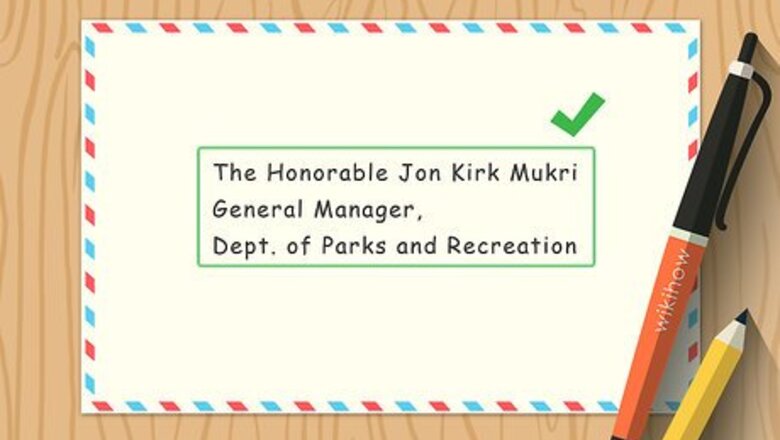
views
- Address your letter with the official's title, full name, and address. Then, make sure to include your name and a stamp in left and right corners respectively.
- Ask for something actionable and realistic. For example, ask them to raise the budget for your child's school.
- Keep your letter formal and appropriate. Show this official respect and use a professional tone of voice.
Addressing the Letter

Learn the official's name. Make sure that you know exactly who this person is, and that he or she is the appropriate person to contact about your case. Clarify why you are writing a letter to this particular official.
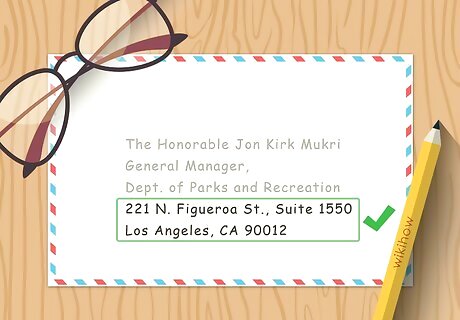
Find the mailing address of the official. Run a web search for "[government official] mailing address." If a web search doesn't turn up the answer, then visit the website for the relevant department of the local, state, or national government. If you’re in the US, you can find a comprehensive list of contact information for national, state, and local administrators at https://www.usa.gov/. If you’re not sure who to address, look for the address of the relevant department. For instance, you could write your local DMV office or the Department of Homeland Security.
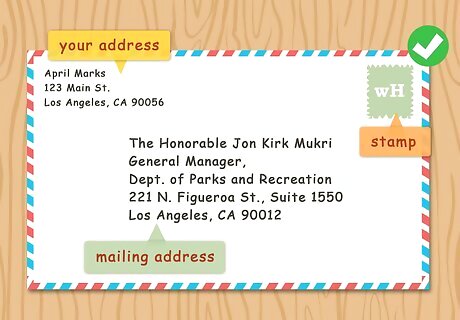
Address the letter. Include the official's title and full name (e.g. President Barack Obama) along with his or her official mailing address. Write the words clearly and legibly in the center of an envelope, and then seal the letter inside the envelope. Stick a stamp in the top-right corner of the envelope. If you are hoping for a response from this government official, make sure to write your full name and return address in the top-left corner of the envelope!
Following Proper Etiquette
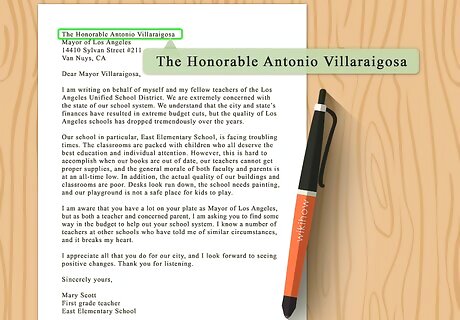
Show due respect. Open your letter with a formal salutation, and end it with an appropriate closing statement. Depending on the level of government, this official may employ a team of secretaries to read through his or her mailbox for important letters. A polite, thoughtful, and well-written letter will almost always be more likely to make it through this filtration system. If writing to an embassy or ambassador, read How to Address Ambassadors. Craft an effective first political letter. "As a new immigrant still getting the hang of writing formal letters in English, I totally leaned on this article's clear examples to properly contact a local official about an issue I cared about. Having those polite templates to model made it way less intimidating to do my first civic letter. It went off without a hitch!" - Hermanto W. Gain insight into political letter-writing. "I appreciated how this piece gave straightforward guidance on best practices for reaching out to leaders, from using the right titles to making realistic requests they can reasonably act on. Getting that inside understanding of how to effectively share my personal story with folks in charge of making actual change locally was clutch." - Julia D. Prepare letters tailored for any official. "I'm currently gunning for a promotion that will require me to write a ton of correspondence with different public administrators. This page's specifics on how to correctly address everyone from mayors to senators now ensures my letters showcase true professionalism. Game changer!" - Nozipho S. Find templates to share your story. "As someone aiming to contact bigwigs about improving issues in my community, I wasn't 100% sure how to even start. But the variety of form letters provided here gave me killer templates for how to compellingly share my own experience while still respecting that these officials have super demanding jobs. Way more approachable than I thought!" - Shyama M. Have a story our readers should hear? Share it with 1 billion+ annual wikiHow users. Tell us your story here.
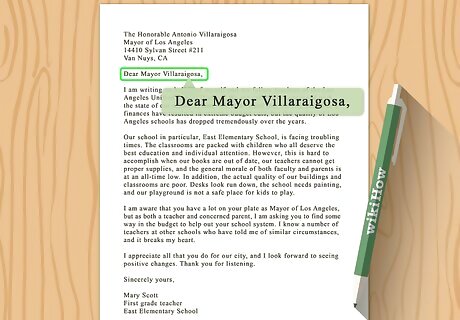
Use the proper title. Address a government official using their title and last name. However, if there is only ever one person in a given post at a time (e,g, the President, the Mayor, or the Speaker of the House,) then you can address the person by his or her title alone: Mr. President or Ms. Mayor. If multiple people hold a given office at one time (e.g. Senator, Justice, Representative,) then you need to use the last name to clarify whom, exactly, you're addressing. It never hurts to include the official's name, even if he or she is the only person holding the position. A personally-addressed letter lends a certain degree of humanity to your message.

Read sample letters, or send a form letter. Do your research to find out how other people have addressed letters to this particular government official. Some activism groups and petition websites will actually provide specific information about contacting the officials relevant to a certain cause. You may also be able to simply email the official. If you’re unsure of what to write, try looking up a form letter and a clear subject line that gets your point across. Some elected officials receive hundreds of letters a day, and oftentimes don’t read them all closely.
Writing an Actionable Letter
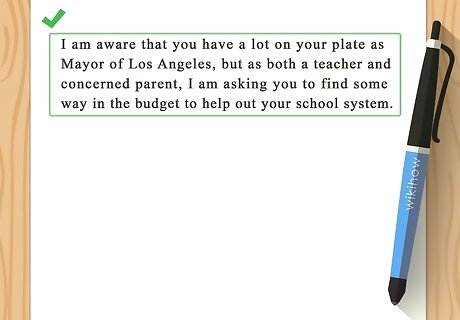
Ask for something doable. Before you send the letter, consider whether this government official will be able to meaningfully act on your letter. Avoid asking for unrealistic things. Do not ask the government official to do more than his/her job allows. Take a step back and consider whether there is a better channel for your complaint. Petitions and form letters are usually well-written and actionable. Make sure, however, that the demanded actions fall within the scope of this official's duties.

Get your letter to the top of the stack. Depending on rank, government officials may receive dozens to hundreds of letters each day. He or she may even employ professional letter-sorters to determine which select few messages actually wind up in the hands of the official. Make your letter polite, concise, and topical. In the first sentence or subject line, reference an issue that is at the top of the official's agenda. The letters that wind up at the top of the stack will be readable, relevant, and easy for the official to understand. Be sure to include your qualifications and explain why the official should listen to you. For example, if you’re a Ph.D., you live in the town that’s been in the news lately, or you recently met the official, they may take note of your opinion.
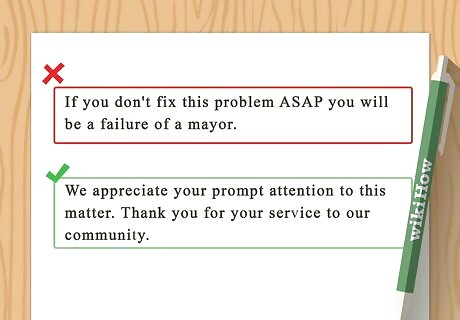
Make sure that your letter is appropriate. Is it necessary, or are you just venting? Send a request that is polite, concise, and realistic. Do not swear or drop insults. Respect begets respect. Do not threaten a government official. The letter can be traced back to you. Beyond any risk, your threats will not necessarily inspire productive action.




















Comments
0 comment